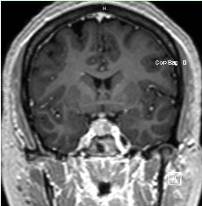Pituitary Tumors
What You Need to Know

- The pituitary gland is a small, pea-sized organ in the brain. Most pituitary tumors are benign.
- Symptoms vary depending on the type of tumor and the affected area of the pituitary gland.
- Your health care provider may order blood and urine tests, CT scan, MRI, or biopsy to diagnose the tumor.
- Treatment may include surgery, radiation therapy, or medication.
What are pituitary tumors?
A pituitary tumor is an abnormal growth in the pituitary gland. The pituitary is a small gland in the brain. It is located behind the back of the nose. It makes hormones that affect many other glands and many functions in your body. Most pituitary tumors are not cancerous (benign). They don’t spread to other parts of your body. But they can cause the pituitary to make too few or too many hormones, causing problems in the body.
Pituitary tumors that make too many hormones will cause other glands to make more hormones. That will cause symptoms related to each of the specific hormones. Many pituitary tumors will also press against the nearby optic nerves. This can cause vision problems.
Most pituitary tumors don’t cause symptoms. As a result, they are not diagnosed. Or they are found only during a routine brain imaging test. About 25% of people may have small pituitary tumors without knowing it.
Below are the main types of pituitary tumors.
Nonfunctional adenomas (null cell adenomas)
These tumors are the most common type. They don’t make extra hormone. You may not have any symptoms until the tumor is a certain size. When the tumor is big enough, it may cause headaches and vision problems. Large pituitary tumors can crush normal pituitary cells. This leads to symptoms caused by decreased hormone production.
Prolactin-producing tumors (prolactinomas)
These benign tumors are also common. They make too much prolactin. If you are a woman, high prolactin levels can make your menstrual period irregular, or even stop your period. These tumors can also cause you to make breastmilk, even if you are not pregnant or nursing. If you are a man, you may have erectile dysfunction or a lack of interest in sex. You may also have enlarged breasts, a low sperm count, or less body hair. In time, you may have headaches and vision problems.
ACTH-producing tumors
ACTH (adrenocorticotropic hormone) stimulates the adrenal gland to make steroids that affect metabolism. These are called glucocorticoids. They reduce redness and swelling (inflammation) all over the body. They also slow down your immune system. Too much ACTH can cause Cushing's disease. This disease causes fat buildup in your face, neck, back, belly (abdomen), and chest. Also your arms and legs tend to become thin. You may also have purple stretch marks and high blood pressure. These tumors can also weaken your bones.
Growth hormone-producing tumors
These tumors make too much growth hormone. In children, too much growth hormone stimulates the growth of almost all the bones in the body. When that occurs, the result is called gigantism. Gigantism can include increased height (over 7 feet), very quick growth, joint pain, and heavy sweating. In adults, too much growth hormone causes a condition called acromegaly. It may include:
-
Extra growth in the skull, hands, and feet
-
Deepened voice
-
A change in the facial appearance because of extra growth in the facial bones
-
A wide spacing of teeth because of the growth of facial bones
-
Joint pain
-
Snoring or sleep apnea
-
Diabetes or impaired glucose tolerance
What causes pituitary tumors?
Experts don't know what causes these tumors. But a condition called multiple endocrine neoplasia type I (MEN 1) may raise your risk. This condition is passed down through families.
What are the symptoms of pituitary tumors?
Symptoms depend on the type of tumor and the affected area of the pituitary gland. These tumors can lead to symptoms caused by too much or too little of the pituitary hormones. Each person’s symptoms may vary. The symptoms may also look like other health problems. Always see your healthcare provider for a diagnosis.
How are pituitary tumors diagnosed?
Your healthcare provider will ask about your medical history and do a physical exam. You may also need one of these tests:
-
Blood and urine tests. These tests will check hormone levels in your blood and urine.
-
CT scan. This test uses X-rays and a computer to make images of your body.
-
MRI. This test uses large magnets, radio waves, and a computer to make detailed images of organs and structures in your body.
-
Biopsy. During this test, the provider removes a tissue sample with a needle or during surgery. It is then checked under a microscope. A biopsy can tell if cancer or other abnormal cells are present.
How are pituitary tumors treated?
Your health care provider will figure out the best treatment for you based on:
-
How old you are
-
Your overall health and medical history
-
How sick you are
-
How well you can handle certain medicines, treatments, or therapies
-
How long the condition is expected to last
-
Your opinion or preference
Treatment may include:
-
Surgery to remove the tumor. Surgery is often a better option for smaller tumors.
-
External radiation (external beam therapy). This treatment sends high levels of radiation right to the cancer cells. Special shields may be used to protect the tissue around the treatment area. These treatments are painless and usually last a few minutes.
-
Radiosurgery (stereotactic radiosurgery) or gamma knife treatment. This uses 1 high dose of radiation sent right into the cancerous tissue. It causes less damage to nearby tissues. It is not actually surgery. But like surgery, it is a 1-session treatment that removes the tumor.
-
Medicine. Different types of medicine may be used to control how much growth hormone is made by the tumor.
Pituitary Tumors: What You Need to Know about Surgery
Learn from Johns Hopkins neurosurgeon and surgical director of the Pituitary Center, Gary Gallia, about what people diagnosed with a pituitary tumor, their family members and caregivers should know about this condition and the latest surgical treatment options available.
When should I call my healthcare provider?
Call your healthcare provider if your symptoms return or you have new symptoms.
Key points
-
A pituitary tumor is an abnormal growth in the pituitary gland. Most pituitary tumors are not cancer (benign).
-
The pituitary is a small gland in the brain. It makes hormones that affect many other glands and many functions in your body.
-
Symptoms vary depending on the type of tumor and the affected area of the pituitary gland.
-
Your healthcare provider may order blood and urine tests, a CT scan, MRI, or biopsy to diagnose the tumor.
-
Treatment may include surgery, radiation therapy, or medicine.







